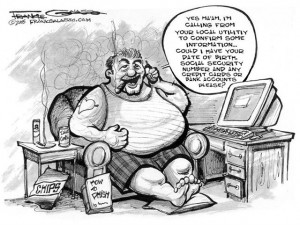Archive for the ‘Small Business’ Category
KikScore SmallBiz Interviews’ Greatest Hits & Top Strategy Tips for Entrepreneurs: Part II
Friday, June 17th, 2011 KikScore has had the pleasure of interviewing many small business owners over the past few years, asking these entrepreneurs about all areas of their businesses and what has spurred their growth, while also throwing in light-hearted pop-culture related questions.
KikScore has had the pleasure of interviewing many small business owners over the past few years, asking these entrepreneurs about all areas of their businesses and what has spurred their growth, while also throwing in light-hearted pop-culture related questions.
In Part I of this two-part Greatest Hits series, I highlighted the top five lessons learned from these interviews with regards to establishing a successful small business. If you missed Part I, click here.
In Part II, I will present five of the most important challenges faced by these small businesses that our interviewees shared with us. These issues are extremely pertinent to all small businesses and it is vital for small businesses to overcome these challenges in order to succeed.
Here we go, the five most common challenges faced by entrepreneurs and their small businesses:
5. Keeping Up with New Technologies
“As the cost of running business with a physical store or office is comparatively high due to the monthly rental fee as well as the consumption of electricity and the hiring of manpower, more and more businesses like us tend to create their presence on the Internet. Without a significant competitive advantage, a retailer will be forced to raise a white flag in this cruel and heartless battlefield.” – Margaret Chan, founder of Cherry’s Brandname Gallery
In today’s world, technology is rapidly changing and businesses must keep up with latest innovations in order to stay modern and be successful. Companies have to start utilizing the internet, for both its e-commerce capability as well as a marketing and advertising tool. Social networks such as Facebook and Twitter are essential to small businesses, as millions of users check and use their personal accounts on those websites multiple times each day.
4. Lacking Adaptability
“While it is important to hold on to your vision, it should never be at the expense of building a sustainable business model. Your business plan whether it is one page or fifty, should be an evolving document that scales to put you in the best possible position to serve your clients and generate revenue.” – Tai Goodwin, founder of Launch While Working
Another challenge entrepreneurs also face is the ineptitude to alter or adjust your business plan. The business world is full of surprises and unexpected circumstances. In order to run a successful company, businesses must be flexible and able to adapt to the changing environment around them.
3. Fear of Failure
“Another challenge I had was more of a mental one, which was the fear of ‘Can I start my own business?’ There are so many company decisions that we take for granted until we have to make them ourselves.” – Gregg Hand, founder and owner of Hand Law Offices
Two weeks ago I mentioned how the number one piece of advice for having success as a small business is keeping the long-term goal in perspective and never giving up or losing hope. Therefore, one of the challenges faced with starting a small business is dealing with the fear of failure. You cannot be afraid that you’re going to fail and act hesitantly because then you will fail; you must be confident with all of your decisions and maintain the passion with which you started your business. Owen Wilson’s character in Wedding Crashers puts it best when talking to his partner, “Your goddamn negativity! I don’t need it! I’m an idea man. I thrive on enthusiasm. Don’t take the wind out of my sails. I need you.”
embedded by Embedded Video
YouTube Video Doesn’t work? Click here.
2. Finding Customers
1. … and then Gaining their Trust
“As a small business I believe our biggest challenge is gaining trust in a potential new customer. If a shopper sees a Macys logo or a Best Buy logo they are not going to question is this a secure company/site. As a brand that is growing, we are not mainstream and are years away from becoming a staple in the beauty industry. We overcome that challenge by gaining one new customer at a time. Proving to that customer we are legitimate business, that is not going to sell their name to any third parties, is going to ship their order, their most private and intimate information is in a very secure area, and if there is any problems whatsoever with their order we will do everything we can to correct it and make it right.” – Brian Esposito, CEO of Avenue You Beauty Store
In order to be successful, you must generate revenue from customers and unless you develop a brand-new product or have a revolutionary idea, you are most likely going to enter into an industry that already has a fair share of other competitors. There lies the biggest challenge of small businesses: finding customers and then keeping them. Finding customers as a small business relies on effective networking and marketing, and especially positive word of mouth. Whether it is online or in newspapers, spreading your name and attracting publicity is a must for businesses to find customers. In addition, promoting your credibility and trustworthiness is a necessity to ensure that once you land a customer, he or she will return.
This is the service that we here at Kikscore provide for online businesses. We show your potential customers that you can be trusted, allowing shoppers to review your record of reliability and creditworthiness through the Kikscore Trust Seal and the KikReport. After overcoming all these obstacles, you’ll be “so money”. More information regarding Kikscore and its trust seal can be found at https://www.kikscore.com/more.html and https://www.kikscore.com/confidence_badge.html respectively.













 As cybercriminals become more advanced and efficient, all businesses must recognize and prepare for the imminent threats of online hackers. The issue of cyber-attacks has made its way to the Senate, debating the amount of power the president should have in dealing with cybercrimes (Full story
As cybercriminals become more advanced and efficient, all businesses must recognize and prepare for the imminent threats of online hackers. The issue of cyber-attacks has made its way to the Senate, debating the amount of power the president should have in dealing with cybercrimes (Full story 



